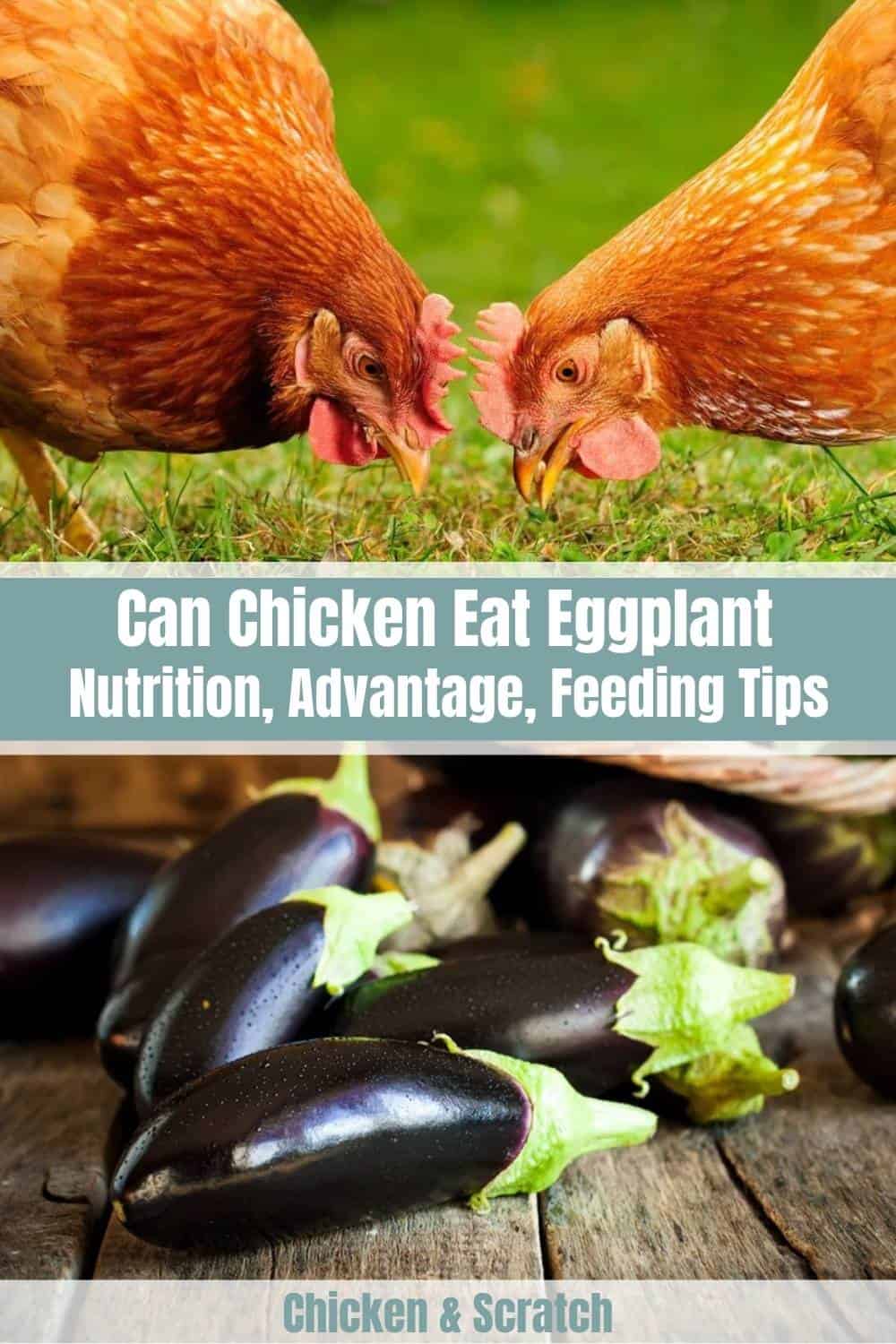Eggplants are exceptionally known to be a good source of vitamins and minerals. Aside from its health benefits, there are also a lot of delicacies that can be made using eggplants. Other than human consumption, chickens can also eat eggplant. These omnivores are fond of eating fruits and vegetables, and eggplant is on the list.
This article will cover
- Are Eggplants Good for Chickens?
- How to Feed Chicken with Eggplants?
- What Part of the Eggplant is Poisonous to Chickens?
- Why is Solanine Bad for Chickens?
- Is Raw Eggplant Poisonous to Chickens?
- Is Cooked Eggplant Okay for Chicken?
- How Much Eggplant is Needed to Feed Chickens?
- Can Chicken Eat Eggplant Seeds?
- Can Chicken Eat Eggplant Skin?
- Can Chicken Eat Eggplant Peels?
- Can I let my Chicken Stay in my Eggplant Garden?
Are Eggplants Good for Chickens?
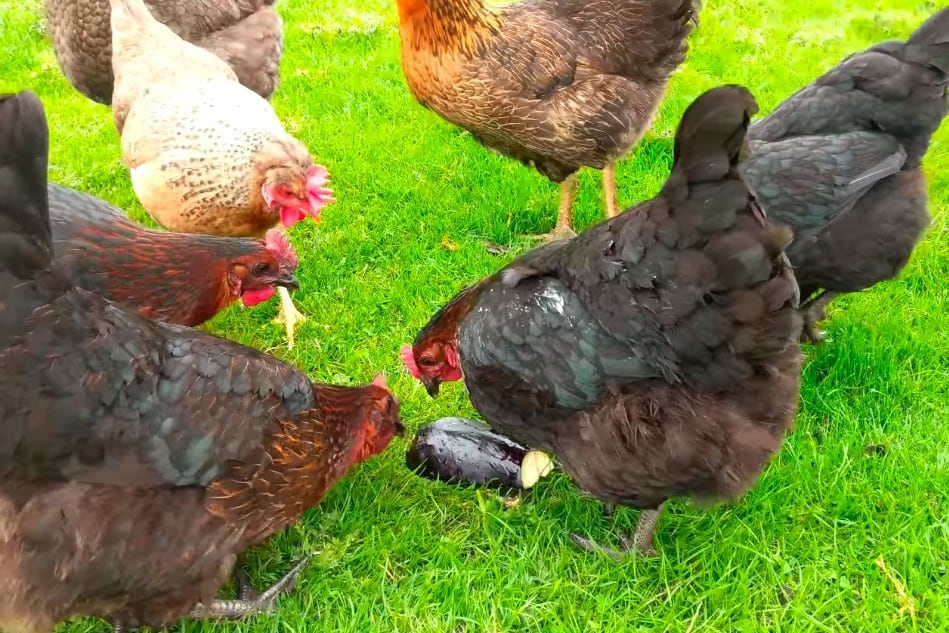
Absolutely yes! Eggplants are consumable by humans since they are very high in vitamins and minerals. The same goes for chickens; eggplants are good for them. Eggplant provides health benefits that are essential for chickens’ growth. If you are a poultry owner, you can feed your Chicken with eggplants.
Eggplants are suitable for chickens, and here is a list of their benefits:
- Antioxidants – An antioxidant is essential for immune system boosting. If your chickens are unhealthy or sickly, they will not lay more eggs.
- Folic Acid – Chickens need a lot of folic acid for egg production. Eggplants are rich in folic acid. Giving your chicken eggplants will increase their egg production.
- Phosphorus – This element is essential for egg development. Phosphorus is necessary for your chickens to metabolize calcium.
- Vitamin C – Vitamin C boosts the immune system of the Chicken. This vitamin helps the Chicken to be healthy.
- Potassium – Eggplant will provide your Chicken enough potassium for muscle development and hydration. Potassium is beneficial, especially if the season is hot. This element will cool down the Chicken.
- Vitamin K – The right amount of Vitamin K helps your Chicken to have healthy bone mineralization. If your Chicken has fewer vitamins K, it may be fatal since it affects blood coagulation.
- Vitamin B6 – Vitamin B6 maintains the chickens’ healthy appetites. If vitamin B6 is not provided to them, this may cause them to become anemic.
- Fiber – Chicken needs 10% fiber on their diet. Eggplant is another source of fiber for Chicken aside from foraging. Giving them eggplant rich in fiber will keep them full and keep their digestive tract regular.
- Thiamine – Chicken needs thiamine to keep up with its metabolism. If Chicken lacks thiamine, it will affect their respiratory rate and body temperature.
- Niacin – Niacin is essential for chickens’ neurological and bone development. Niacin is also responsible for converting various nutrients into usable energy.
- Copper – Copper is essential for chickens’ development. It improves the eighth development of Chicken. It also decreases the cholesterol level of the Chicken, which is suitable for meat production. Also, without copper, chickens will be susceptible to anemia.
- Manganese – Manganese is an essential element in the growth, bone development, and shell quality of the Chicken.
How to Feed Chicken With Eggplants?
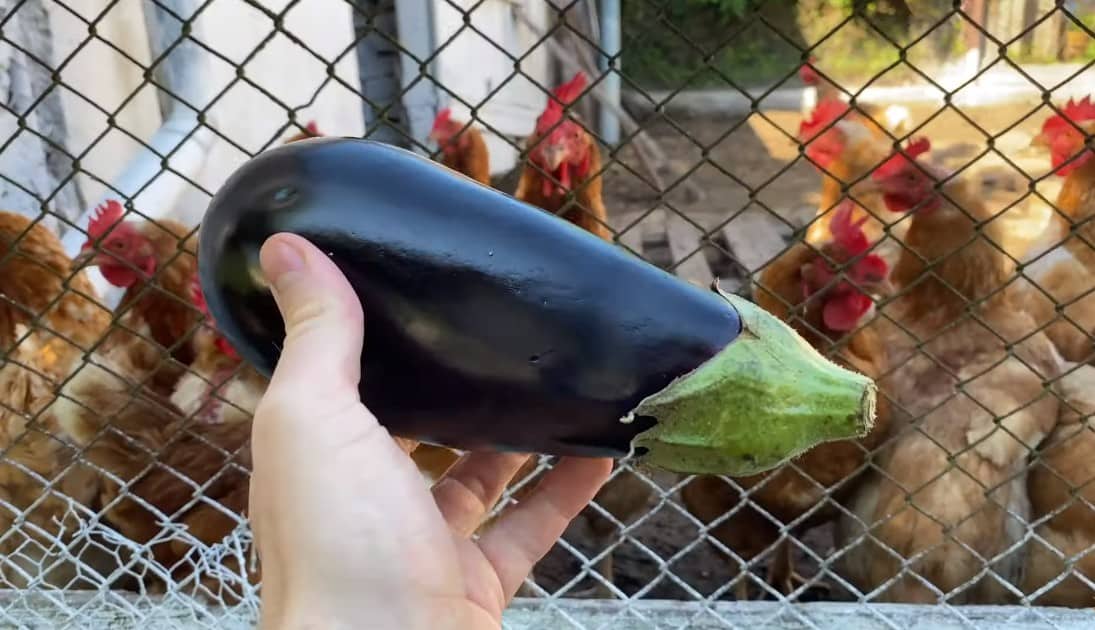
When you are feeding your chickens with eggplant, it must be adequately prepared. Though eggplants are edible and healthy, some parts of them are poisonous. These parts include the stem and the leaves. These should be removed before serving to chickens.
The same as to humans, eggplant consumption for Chicken varies. This plant can be served raw or cooked. Here’s how:
Raw
Eggplants have different sizes, and it is best to cut them in half when serving them to chickens. You may serve it on grasses with the cut facing upward to allow the Chicken to peck the eggplant. You can also hang it and will enable the Chicken to nibble the skin.
Some would prefer cutting the eggplant into cubes and mixing it with other chicken foods or vegetables. Chicken loves to eat them fresh, especially during hot summer days. It keeps them cool.
Cooked
You can steam the eggplants since some chickens prefer eating them cooked. Steamed eggplant is good since cooking the eggplants gets rid of its bitter taste. Never add salt to the eggplant that you serve.
Serving eggplants to chickens can be done in various ways The only thing that needs to be considered is feeding your chickens with eggplant leftover from your meals. Some eggplant delicacies have seasonings that can be harmful to your Chicken.
Also, frying the eggplant removes its nutrients. Whatever your options may be, the Chicken will still eat the skin, flesh, and seeds of the eggplant.
It is suggested that you need to give eggplant as a treat to Chicken and not the whole portion of it. Though eggplants are good for chickens, there must be moderation to prevent chickens from having calcium deficiency.
What Part of the Eggplant is Poisonous to Chickens?
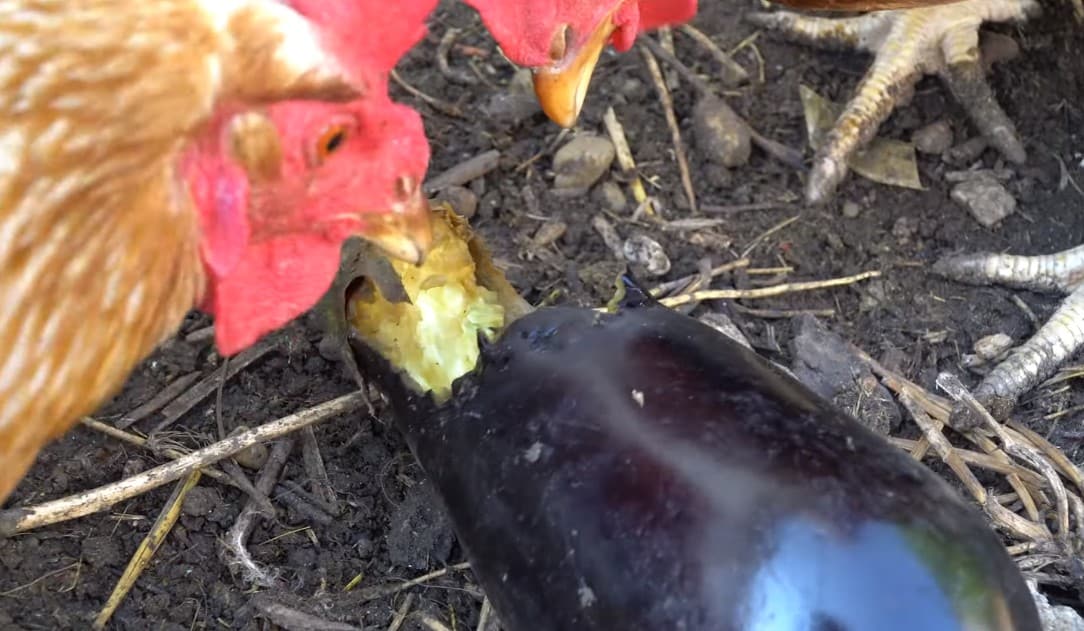
Eggplant belongs to the nightshade family, which contains solanine and is toxic to animals and humans. The green parts contain toxins and are very harmful. These parts of the eggplant include the leaves, stem, and calyx.
When a chicken eats the calyx or leaves of the eggplant, it will result in a burning or flaming reaction to the throat. An excessive amount of solanine will also result in vomiting, nausea, irregular beating of the heart and could be fatal, leading to the death of your flock. This is detrimental, especially to weak or small chickens.
That is why in feeding your Chicken, you should remove the green parts and leaves at the tip of the eggplant. Before serving them, make sure to wash them first.
Why is Solanine Bad for Chickens?
Solanine is poisonous to animals and humans. Solanine has toxic properties that act as a natural defense for plants. When eaten, solanine can cause gastrointestinal and neurological disorders once a large amount is taken. The poisonous part of the eggplant is the calyx, stem, and leaves. If the Chicken ate enough or too much of it, they might experience the following:
Lethargy
The Chicken will tend to lose their energy. They will feel weak and sluggish. It is best to seek medication or assistance from a veterinarian.
Excessive drooling
Chickens don’t drool, and if chickens may experience this, their body is not in the proper state. Excessive drooling can be experienced by chickens with a lot of solanine intake. Once your chickens experience this, go to the veterinarian for further medical analysis.
Diarrhea
Solanine causes gastrointestinal disorder, which results in diarrhea.
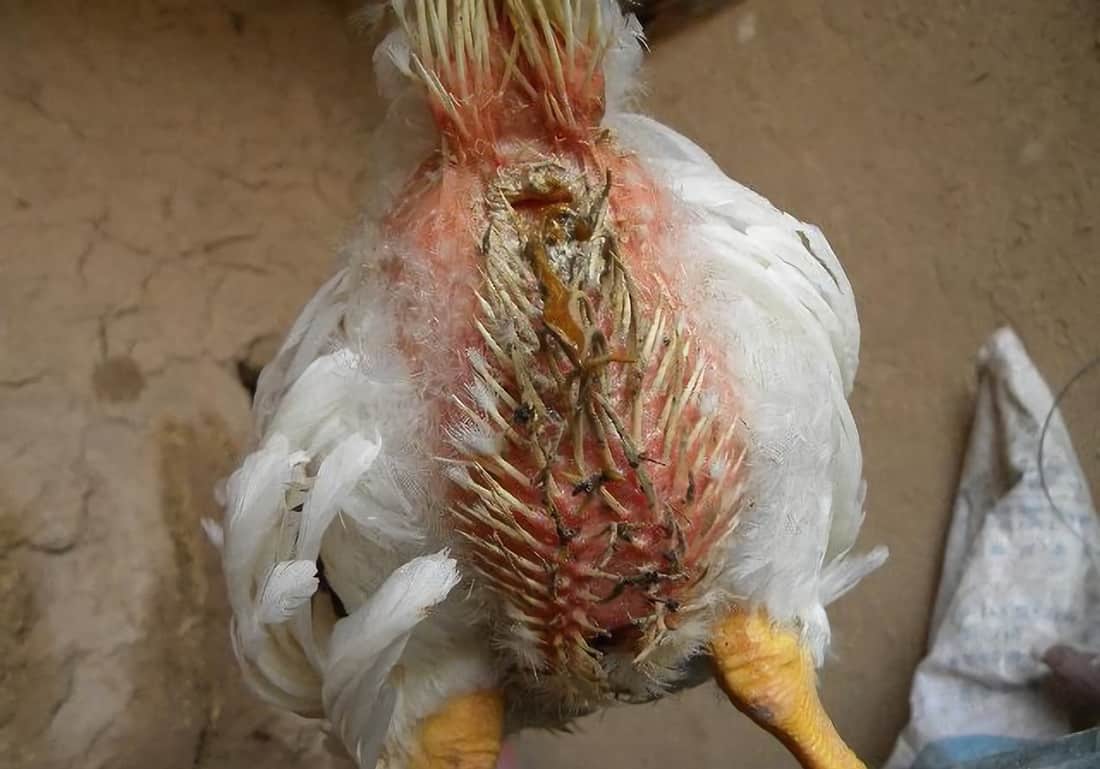
Appetite Loss
The Chicken will eat less or not eat at all once it has taken a lot of solanine. It is best to ask veterinarians what are the best things to be done to save your chickens. Young chickens can go 6 hours, and adult chickens can go 8 hours without food and water.
Trouble Breathing
Solanine will make your Chicken uncomfortable and heavy breathing.
Death
An excessive amount of solanine is fatal and can cause death to your Chicken.
Is Raw Eggplant Poisonous to Chickens?
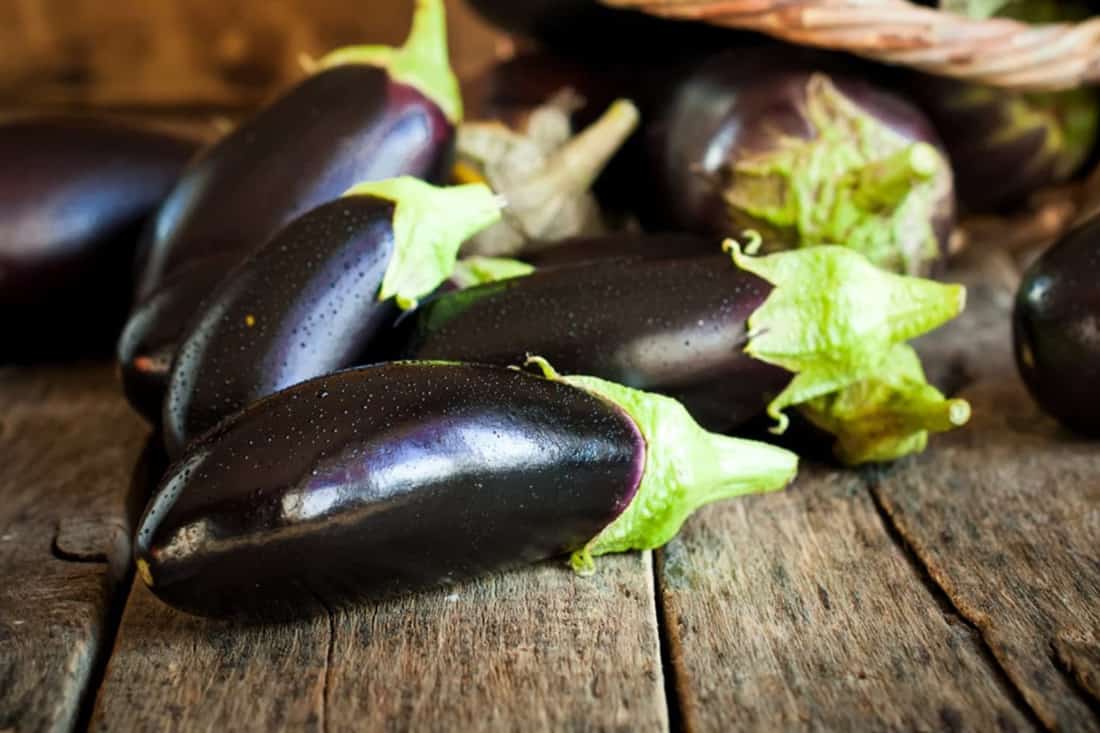
Raw eggplants are not poisonous to Chicken. However, its leaves, stem, and calyx are toxins that can cause harmful effects to chickens once eaten. These parts of the eggplants contain an alkaloid called solanine, which can be poisonous. Taking large amounts of solanine can be fatal. To avoid food poisoning to Chicken, wash the eggplant and remove the greeneries attached to the eggplant.
Is Cooked Eggplant Okay for Chicken?
Cooked eggplant is okay for Chicken as long as it is not heavily salted or mixed with spices and seasonings. Seasoning may cause harmful effects to your Chicken. When serving the cooked eggplant, you can steam it to reduce its bitter taste. Avoid frying the eggplant since it will reduce the nutrients, plus it absorbs a lot of oil.
How Much Eggplant is Needed to Feed Chickens?
Eggplants must only be 10% of the total consumption of chickens. When chickens forage food in the ground, it allows them to get more nutrients. However, if you feed them with too much eggplant, they might not forage for more food since they may feel full. Insufficient nutrient intake will result in weight loss for chickens.
Can Chicken Eat Eggplant Seeds?
Chicken can eat the seeds of the eggplant since it is not poisonous and is safe to eat. However, if the seeds have a dark color, they have been sitting for so long that they taste bitter. Some darker color seeds may be spoiling and must be discarded.
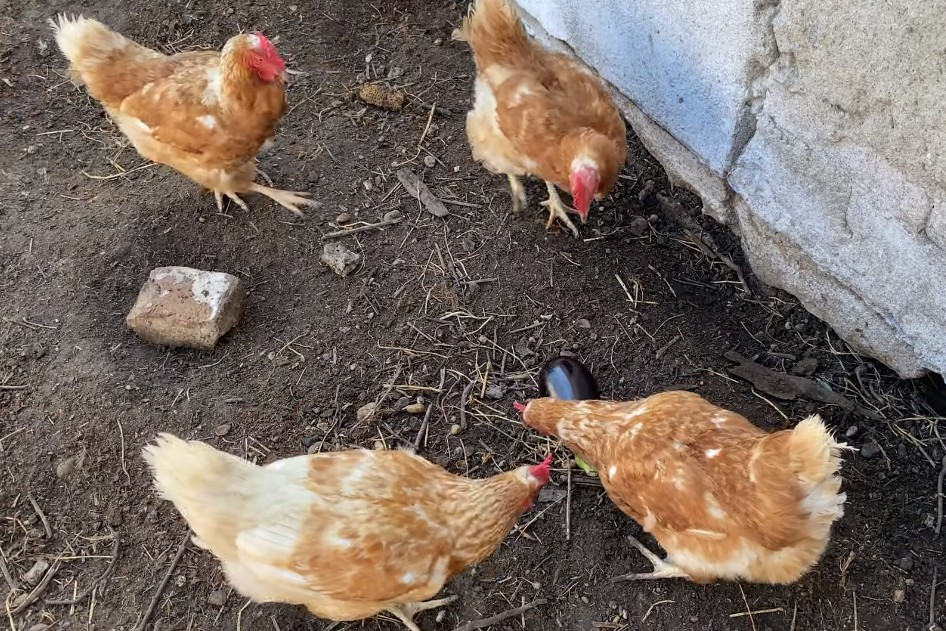
Can Chicken Eat Eggplant Skin?
The skin of the eggplants is edible and safe to be eaten. Eggplants’ skin is also full of antioxidants called Nasunin. These antioxidants protect the cell membrane, prevent neuroinflammation, and increases blood flow.
Can Chickens Eat Eggplant Peels?
Definitely yes! Eggplant peels are nutritious and healthy. Just make sure you have removed the green parts of it to avoid food poisoning.
Can I let my Chickens Stay in my Eggplant Garden?
No, if you let them around your eggplant garden, they might eat the leaves of your eggplants. The leaves are poisonous and can cause harm to your Chicken. You can let the Chicken stay in your eggplant garden as long as they are cooped; make sure they don’t have access to the eggplant leaves and stem.
Summary
Feeding your chickens with eggplants gives them good nutrition and gives them hustle-free feeding preparations. However, do not overfeed your Chicken to maintain a balanced diet for them. Though eggplants are healthy, proper preparation is needed. When serving it to the chickens, remove the stem and leaves because they are poisonous.
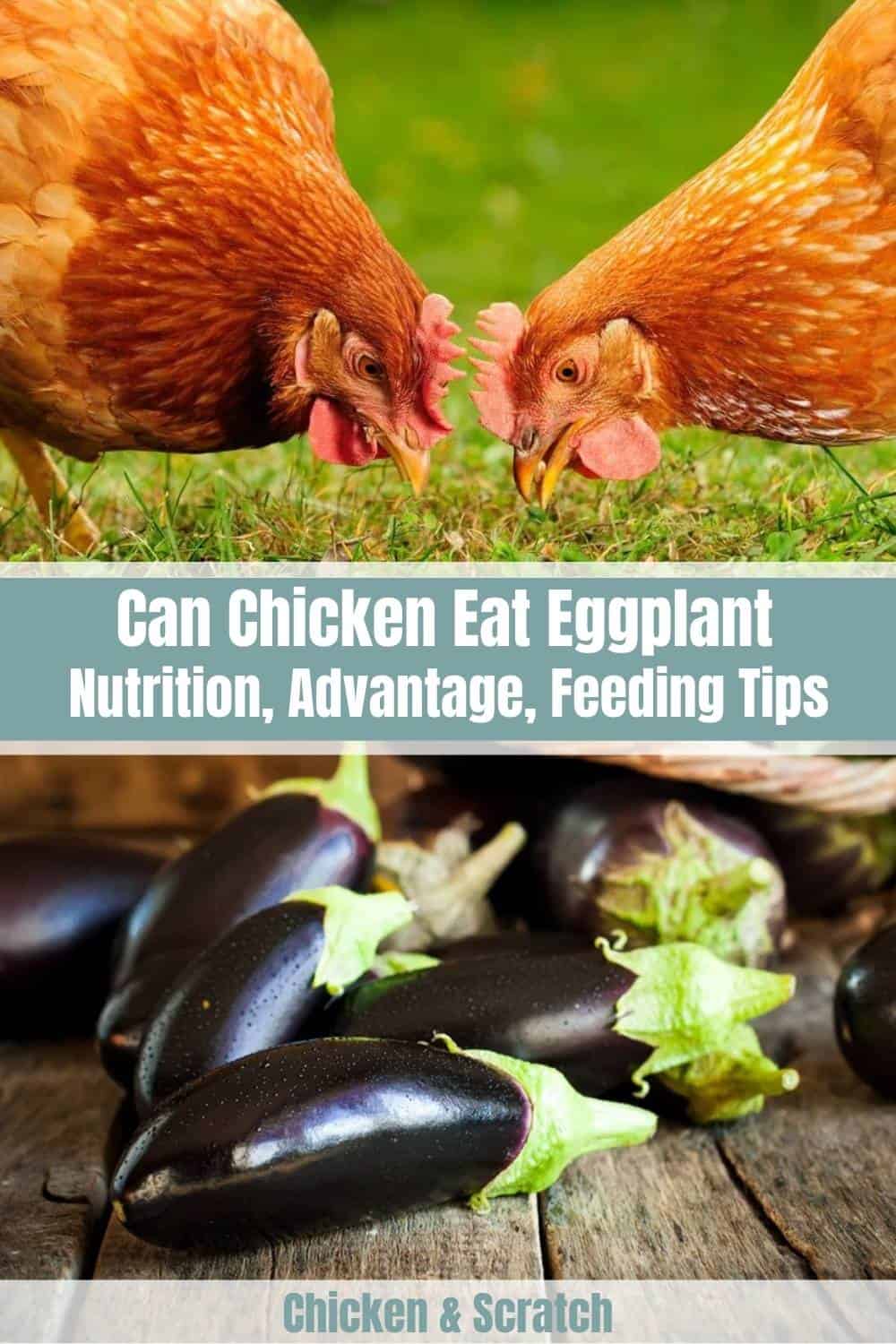

Joseph Hudson has been raising chickens for over 15 years. In 2018, he completed the Agriculture & Natural Resources program at Mt. San Antonio College. He currently raises over 1400 chickens on his 7.5-hectare farm. He keeps sharing his experience on raising healthy and happy chickens on Chicken Scratch The Foundry.
